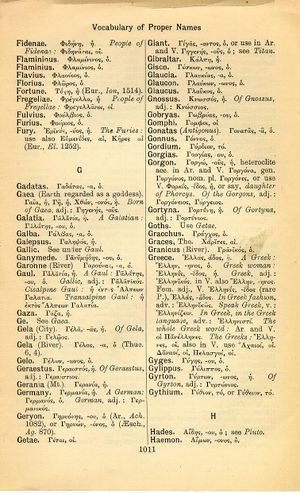Glaucus
Τούτῳ τῷ λόγῳ χρήσαιτο ἄν τις ἐπ' ἐκείνων τῶν ἀνθρώπων οἳ παραδόξως ἀλαζονεύονται, μηδὲ τὰ κοινὰ τοῖς ἀνθρώποις ἐπιτελεῖν δυνάμενοι → One would use this fable for those who give themselves unreasonable airs, but can't handle everyday life (Aesop 40)
English > Greek (Woodhouse)
Γλαῦκος, ὁ.
Latin > English (Lewis & Short)
Glaucus: i, m., = Γλαῦκος,
I a Greek proper name.
I A son of Sisyphus, devoured by his own horses, Verg. G. 3, 267.—
II The commander of the Lycians in the Trojan war, a friend of Diomede, Hor. S. 1, 7, 17.—
III A fisherman of Anthedon, in Eubœa, who was changed into a sea-god, Ov. M. 13, 906 sq.; 14, 9; 38; 68; 7, 233: Glauci chorus, the Nereids, Verg. A. 5, 823; Stat. Th. 7, 335.
Latin > French (Gaffiot 2016)
(3) Glaucus,¹³ ī, m., fils de Sisyphe, père de Bellérophon, déchiré par ses cavales : Virg. G. 3, 267 || pêcheur de Béotie, changé en dieu marin : Ov. M. 13, 906 ; cf. Virg. En. 5, 823 || guerrier lycien, au siège de Troie : Hor. S. 1, 7, 17.

